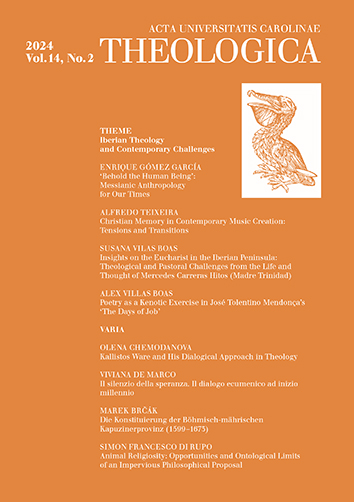AUC Theologica is a peer-reviewed journal for theology published twice a year. As we publish original papers in English, German, French, and Italian, our mission is to serve as a platform both for Czech researchers, who can present their research results in these languages, and for international contributors, who are invited to enter the academic theological discussion in the heart of Europe.
The journal focuses on a wide range of theological disciplines, such as systematic theology, biblical studies, patristic studies, pastoral and spiritual theology, religious education, church history, etc. Within these fields, the journal seeks to reflect the current theological questions and problems, which often requires interdisciplinary approaches. Supporting the intersection of various theological disciplines, we thus also welcome theological papers touching other academic fields including philosophy, sociology, literary studies, and science.
Each issue consists of two sections. The thematic section presents papers of the same focus. The section called ‘Varia’ invites papers dealing with various theological themes from the perspective of all Christian traditions. Our current and past issues are approachable for free on this website in the form of Open Access.
AUC THEOLOGICA, Vol 6 No 1 (2016), 105–117
Angels as Mirrors of the Human: The Anthropologies of Rilke and Bonaventure through the Lenses of Hans Urs von Balthasar
Yves De Maeseneer
DOI: https://doi.org/10.14712/23363398.2016.6
published online: 01. 07. 2016
abstract
In this article we present a theological-anthropological exploration, interpreting the figure of the angel as a mirror of our human condition. The point of departure is an analysis of Hans Urs von Balthasar’s approach to two major sources of our imagination of the angel: Bonaventure (1221−1274) and Maria Rainer Rilke (1875−1926). A comparison of his accounts of the Franciscan theologian and the Modern poet, respectively, reveals remarkable parallels in discourse, clustered around the tensions between vulnerability and openness, immanence and transcendence, and love and loss. Both Rilke and Bonaventure reject the classical angel figure as a human ideal, as it cannot integrate the paradoxes of human existence. Their alternative visions of what it means to be human, have many terms in common: heart, vulnerability, mortality, openness, abyss, suspension, transparency, receptivity, descent (kenosis), humility, poverty, etc. However, their meaning is different because Rilke does not recognize an absolute transcendence as the source of love and the vis-a-vis of the human. This immanentism leaves him no other option than the vain attempt to exorcize the angel figure altogether, while Bonaventure’s vision preserves the angel as an anthropological mirror, albeit an angel radically transfigured by God’s wounded love.
keywords: Theological anthropology; angels; Hans Urs von Balthasar; Bonaventure; Rainer Maria Rilke

Angels as Mirrors of the Human: The Anthropologies of Rilke and Bonaventure through the Lenses of Hans Urs von Balthasar is licensed under a Creative Commons Attribution 4.0 International License.
148 x 210 mm
periodicity: 2 x per year
print price: 100 czk
ISSN: 1804-5588
E-ISSN: 2336-3398
